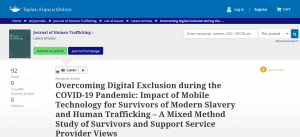Providing smartphones to survivors of modern slavery and human trafficking
People rely on smartphones and the internet to communicate with each other. However, some people have little or no access to this technology. This is known as ‘digital exclusion’. People who are digitally excluded often also have other serious social and health issues to deal with in their lives.
This project aimed to tackle digital exclusion among survivors of modern slavery and human trafficking. We worked with Unseen UK, a Bristol-based charity that gives care and support to survivors, offering a safe place for them to recover from trauma and rebuild their lives.
Survivors of modern slavery (defined by the Modern Slavery Act 2015) may have experienced:
- forced work through mental or physical threat or abuse
- being dehumanised and treated as a commodity
- being physically constrained, including being trafficked for sexual exploitation or forced labour
The telecommunications company BT donated smartphones, SIM cards and data bundles to 74 survivors who were being supported by Unseen. Researchers based at the NIHR Applied Research Collaboration West (ARC West) and the Elizabeth Blackwell Institute at the University of Bristol wanted to see if access to smartphones could improve the mental health and wellbeing of survivors.
What we did
We trained and supported Unseen staff to do short interviews with survivors who were given mobile phones.
Unseen staff interviewed 27 survivors of 15 different nationalities. We collected phone use data and measured their wellbeing using a capability wellbeing measure called ICECAP-A. This is a holistic quality-of-life measure that focuses on a person’s current experience of independence, security, love and friendship, achievement and enjoyment.
We also surveyed 12 members of Unseen staff. They shared their thoughts about the project, the impact that the phones have had on survivors and lessons learnt about rolling this out more widely.
We analysed the data and published a report with Unseen (PDF). Also, our article in the Journal of Human Trafficking shows that having mobile phones made a difference to survivors’ wellbeing and mental health.
What we found and what this means
Our main finding is that smartphones are very valuable for support, integration and access to services. They improved survivors’ wellbeing:
“You cannot live without the phone, it’s like… your best friend… it gives less stress …you can make it easy where you are, call your friends, call people … arrange appointments, Google Translate, email, which definitely makes me feel safe in day-to-day activity.”
Smartphones helped survivors develop the skills they need to move towards independent living, finding their way around services, systems and local areas:
“This telephone keeps me orientated because I sometimes have problems with knowing where I am and where I need to go, and this phone helps me to keep a chart of all the places.”
Smartphones and data bundles helped survivors to stay in touch with family, friends and support networks, including health and legal services and parenting support. Survivors could access educational courses and resources, and use translation, communication and navigation tools to find their way in new situations:
“Yeah, I’m doing an IT course. Yes, it helps me because sometimes I was going into YouTube, getting classes from YouTube to learn more.”
Access to technology should not be seen as a solution on its own. It should be offered as part of a holistic support package for survivors that meets their needs. Support staff should play a key role in enabling access.
Report
Read the academic research article, published in the Journal of Human Trafficking.
Download ‘Impact of mobile technology for survivors of modern slavery and human trafficking: A mixed method study’ (PDF) from the Unseen website.
Watch the video
Find out more about this project in this video:
What next?
Our research showed that having a mobile phone helped survivors in many ways. Our policy recommendations include:
- Policy makers should see access to technology as an essential, standard part of survivor support and provide this to meet survivors needs
It is possible to offer and support the safe use of mobile technology as part of survivors’ recovery. Suitable technology packages should be made available to all survivors, after safety planning, technology training and a risk assessment. These should be offered when survivors access the National Referral Mechanism and the Modern Slavery Victim Care Contract. - Unlimited data would enable survivors to benefit fully from technology
Unlimited data allowances would improve the positive impact technology has on survivors’ lives. It would enable survivors access for all their education, wellbeing, communication and childcare needs. Access to unlimited data would prevent survivors having to make hard choices about what to access and avoids stress and anxiety. - Survivors, service providers and government need to work together to develop the most suitable technology support packages
More projects working with survivors would give us better evidence about what they need to support their recovery. This evidence could identify best practice and inform government support for survivors.
We are linking with others who are working and researching in this area, to develop plans for how technology can be integrated into support packages in a cost-effective way, to support policy development.
This work was supported by the Elizabeth Blackwell Institute, University of Bristol, the Wellcome Trust Institutional Strategic Support Fund, and the Rosetrees Trust.
Paper

Overcoming Digital Exclusion during the COVID-19 Pandemic: Impact of Mobile Technology for Survivors of Modern Slavery and Human Trafficking – A Mixed Method Study of Survivors and Support Service Provider Views
Read the paperLead collaborators
- Kate Garber, Unseen
- Lauren Saunders, Unseen
